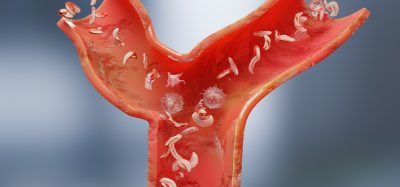Genomic sequencing helps find treatment for rare genetic skin disorder
Posted: 2 June 2023 | Izzy Wood (Drug Target Review) | No comments yet
US researchers use genome sequencing to reveal genetic basis for disabling pansclerotic morphea, a severe inflammatory disease.


Researchers at the National Institutes of Health (NIH), in collaboration with scientists from the University of California San Diego (UCSD) and the University of Pittsburgh, US, have made a significant breakthrough in the understanding and potential treatment of a rare and severe inflammatory skin disorder known as disabling pansclerotic morphea, by looking into the genome. The findings of their study were published in the prestigious New England Journal of Medicine.
Disabling pansclerotic morphea, a disorder first documented in medical literature a century ago, is characterised by debilitating symptoms including severe skin lesions, impaired wound healing, deep scarring of the skin and muscles, and joint stiffness, ultimately leading to reduced mobility. Due to its rarity, the genetic cause of the disorder remained unknown until now.
In their investigation, the researchers utilised genome sequencing to examine four individuals affected by disabling pansclerotic morphea. Their analysis revealed that all four patients had genomic variants in the STAT4 gene, which encodes a protein called STAT4 that regulates inflammation and wound healing. Importantly, the study uncovered that these genomic variants led to an overactive form of the STAT4 protein, initiating a harmful feedback loop of inflammation and impaired wound healing that worsens over time.
To disrupt this detrimental feedback loop, the researchers targeted an essential protein in the inflammatory pathway, Janus kinase (JAK), which interacts with the overactive STAT4 molecule. They employed a JAK-inhibiting drug called ruxolitinib in the treatment of the patients, and the results were remarkable. The patients’ rashes and ulcers experienced a dramatic improvement
According to Sarah Blackstone, a predoctoral fellow within the NIH’s Inflammatory Disease Section and co-first author of the study, “Researchers previously thought that this disorder was caused by the immune system attacking the skin. However, we found that this is an oversimplification, and that both skin and the immune system play an active role in disabling pansclerotic morphea.”
Disabling pansclerotic morphea has lacked a standard treatment due to its rarity and limited understanding. Existing therapies aimed to halt the progression of the disorder have been largely ineffective and often accompanied by severe side effects. Consequently, the discovery of ruxolitinib’s potential efficacy presents a crucial breakthrough in the field.
“So far, there has not been a standard treatment for this disorder because it’s so rare and not well-understood. However, our study gives an important new treatment option for these patients,” said Blackstone.
Ruxolitinib belongs to a class of drugs known as JAK inhibitors, commonly utilised to address conditions such as arthritis, eczema, and ulcerative colitis—chronic inflammatory diseases. The researchers believe that their findings have broader implications, potentially paving the way for JAK inhibitors to treat other inflammatory skin disorders and conditions associated with tissue scarring, including those affecting the lungs, liver, or bone marrow.
“This study’s findings open doors for JAK inhibitors to be a potential treatment for other inflammatory skin disorders or disorders related to tissue scarring, whether it is scarring of the lungs, liver, or bone marrow,” stated Dan Kastner, an NIH distinguished investigator, head of NHGRI’s Inflammatory Disease Section, and a senior author of the study.
The researchers are eager to continue their investigation into other molecules involved in this pathway and explore how they are affected in patients with disabling pansclerotic morphea and related conditions. They hope that further research in this area will shed light on a broader range of more common diseases.
Related topics
Disease Research, Genome Editing, Genomics, Sequencing
Related conditions
pansclerotic morphea
Related organisations
National Institutes of Health (NIH), University of California San Diego (UCSD), University of Pittsburgh
Related people
Dan Kastner, Sarah Blackstone







